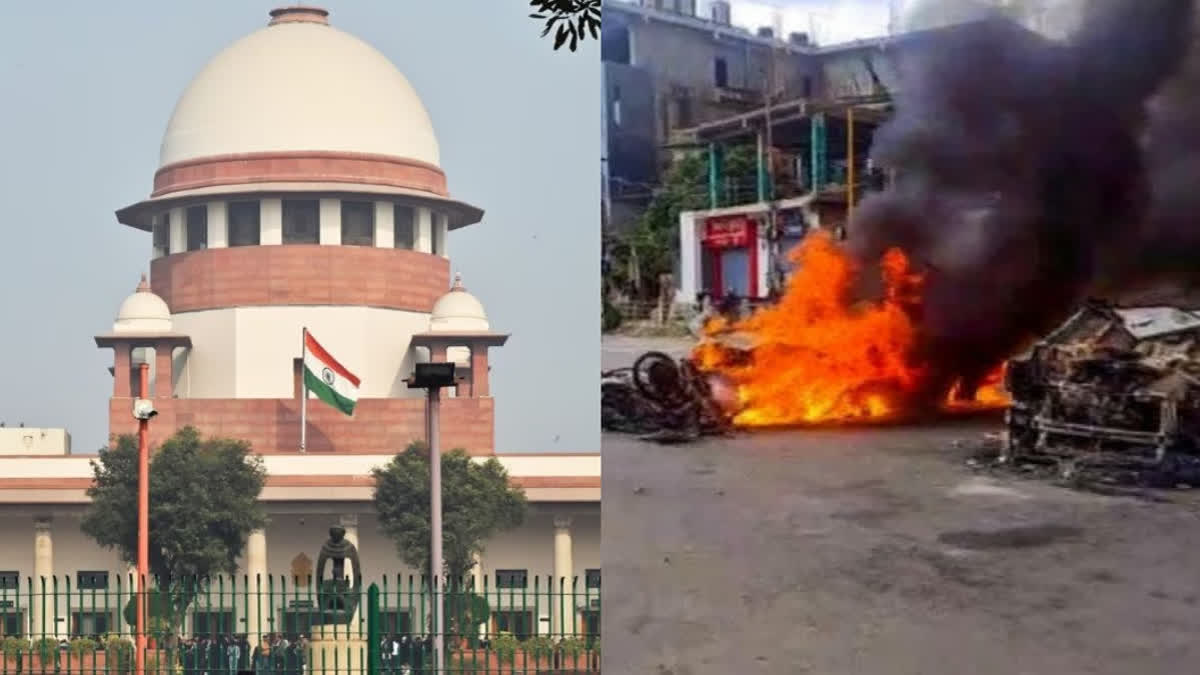New Delhi: The Supreme Court Tuesday issued directions to ensure the burial or cremation of all dead bodies, including 88 identified but unclaimed ones, in Manipur mortuaries. On repeated obstruction by one of the petitioner's counsel, the apex court remarked that it would not allow attempts “to keep the pot boiling" over dead bodies.
Senior advocate Colin Gonsalves, representing one of the petitioners, submitted before a three-judge bench led by Chief Justice of India D Y Chandrachud that “we want to know the details of the nine sites” identified by the government for the burial of bodies. Solicitor General Tushar Mehta, representing the Manipur government, questioned Gonsalves, “Who are we?” Mehta contended that the next of kin of the identified bodies are willing to claim them but civil society organizations are fomenting trouble.
Gonsalves said he was representing the next of kin. Mehta said he was objecting to organizations with a vested interest. At this juncture, the CJI orally remarked that he could not accept an obstructionist approach against the burial of bodies and said he would not allow attempts to “keep the pot boiling" over dead bodies. An apex court-appointed committee had reported that among 175 bodies in mortuaries, 169 were identified – 81 claimed, 88 identified but not claimed.
Senior Advocate Indira Jaising, appearing for another petitioner, urged the bench to ensure that the bodies are buried with dignity as per the customary or religious practices and that DNA samples of bodies should be stored as evidence in the criminal trials. Mehta agreed with both suggestions and requested the bench to direct that organizations not interfere with the burial of the bodies.
The bench, also comprising Justices J B Pardiwala and Manoj Misra, stressed that the dead bodies cannot remain in mortuaries for an indefinite period and directed that last rites can be done by family members for identified and claimed bodies at any of the nine sites without any hindrance by any other parties. While issuing a slew of directions, the bench said either the families can claim them or the state will go ahead as per the municipal law.
The apex court said state authorities will inform the next of kin of the identified bodies, which have already been claimed, about the sites and this process should be completed on or before December 4.
The bench said regarding the bodies which have been identified but which have not been claimed, the state administration shall issue a communication to the next of kin on or before Monday intimating the next of kin that they are permitted to carry out the last rites together with requisite religious observances within a period of one week. The bench allowed that state to carry out the burial/cremation of unidentified bodies with due observance of religious rites.
The bench said the collector and the superintendent of police (SP) would be at liberty to take all appropriate steps for the maintenance of law and order so as to ensure that the burial/cremation takes place in an orderly manner.
The bench said in the event that DNA samples have not been drawn at the stage when the autopsies were conducted, the state shall ensure the drawing of such samples before the process of burial/cremation takes place. The apex court allowed the state government to issue a public notice indicating that if bodies, which are identified, are not claimed within a period of one week from the date of issuance of the notice, the state shall carry out the last rites.
The apex court has scheduled the matter for further hearing on December 4, regarding the issues raised in the committee’s report about the acceptance of ex-gratia to the kin of the victims.
The apex court-appointed committee, in a report, reportedly said that the state NGOs are preventing the cremation of 88 bodies preserved in Imphal mortuaries, and obstructing acceptance of ex-gratia by kin. During the hearing today, Mehta said attempts were being made by civil society organizations to keep the pot boiling in the state, hit by ethnic violence. The committee headed by Justice (retd) Gita Mittal also includes justices (retd) Shalini P Joshi and Asha Menon.
Ethnic violence broke out in Manipur in May this year, over a high court order directing the state government to consider including the non-tribal Meitei community in the list of Scheduled Tribes.
Also read:
- Manipur violence: SC asks Centre to examine a request by 284 students seeking relocation to central universities
- PM didn't have courage to visit Mizoram 'fearing criticism' for his unwillingness to go to Manipur, claims Cong
- Manipur govt in talks with Imphal Valley-based insurgent group, peace accord to be signed soon: CM



